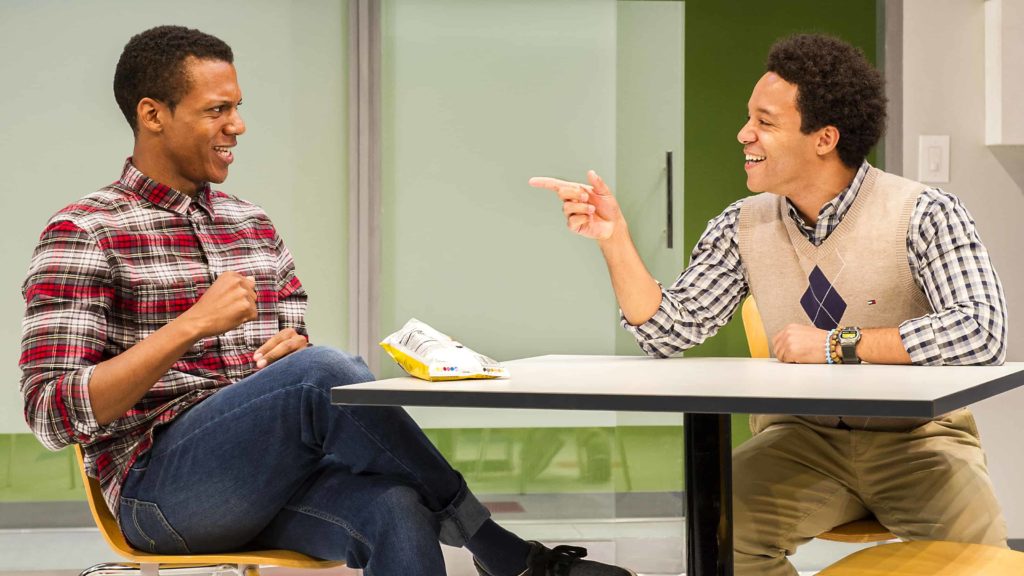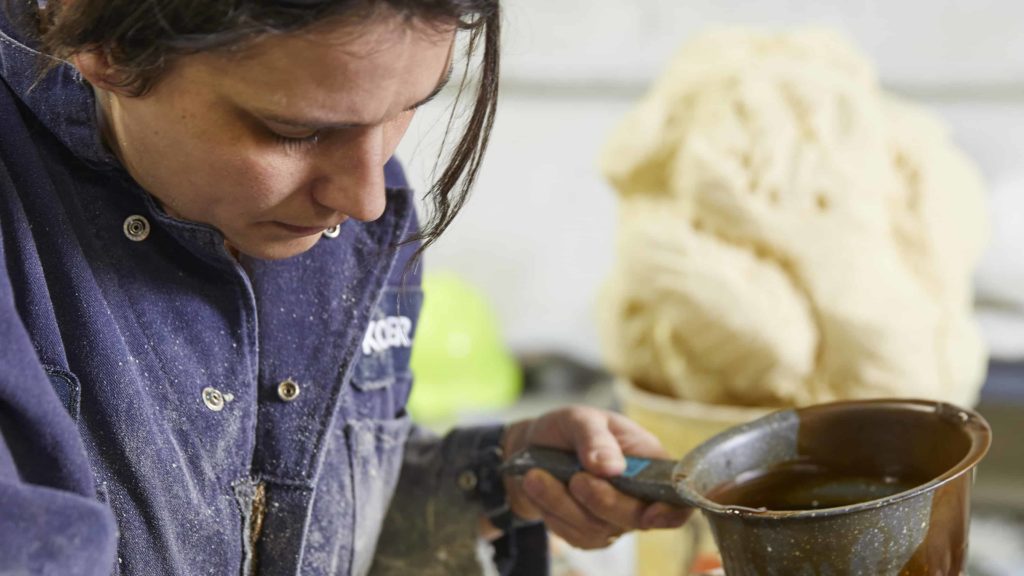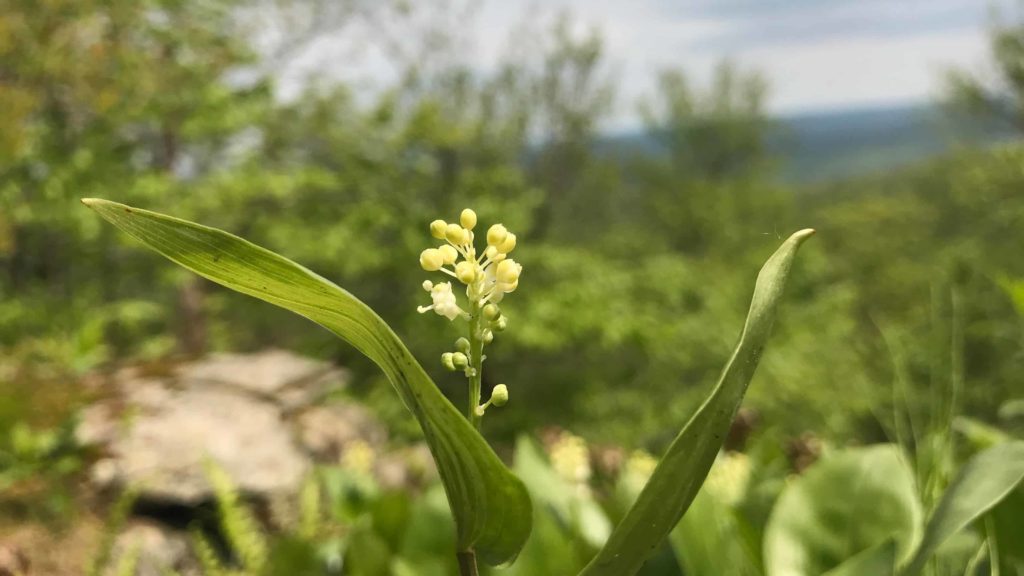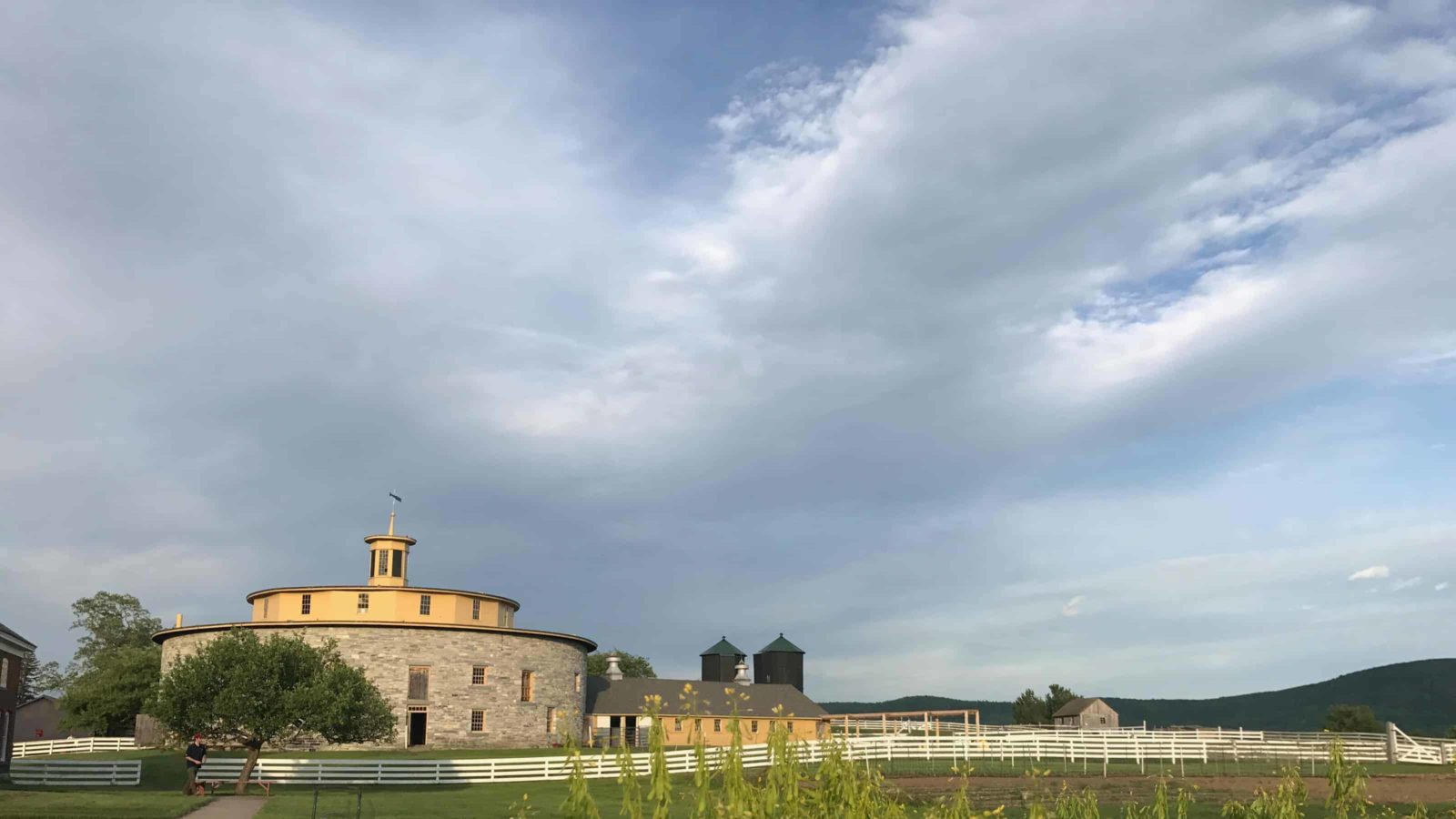Dancers circle the stage like raptors gliding. Outside on a summer day, the dance company Pilobolus performs on the Inside/Out Stage at Jacob’s Pillow.
Their clothing blends into the shades of their skin, and they shape natural forms from the place around them. Their lithe bodies twine. They move together, and they carry one another. They climb trees as fluidly as they hold each other.
Birdsong plays with the sound of low strings and a single line of piano. On the light stage in the sun, the dancers seem to be dancing with their own shadows and the shadows of leaves.
Pilobolus created the work here to celebrate the Pillow’s 85th anniversary. And this spring on Earth Day, the Pillow brought them back — on the web. Within the last few weeks, the Pillow, like many creative places in the region, has turned to virtual programming and social media.
In the wake of the coronavirus, the Pillow has cancelled their 2020 summer festival until people can gather safely again. At the end of April, as they went live with newly expanded Virtual Pillow programming on their website, they gathered more than 1,000 people on Zoom to watch Pilobolus perform Branches.
After the screening, executive and artistic director Pamela Tatge talked live with Matt Kent and Renée Jaworski, co-artistic directors of Pilobolus, and composer and sound designer David Van Tieghem, about how they created Branches, and about all that has happened since the 2017 premiere.
“What we do needs to be quintessentially Pillow,” Tatge said by phone, looking forward to this first online performance in the Pillow’s new series. “It has to be content you can’t get anywhere else. We are saturated now with opportunities for viewing content online. At the Pillow, we need to connect to our (physical) site and our history, and as much as possible have people come together to witness it.”

Pilobolus dance company created and performed a new work at Jacob's Pillow International Dance Festival in summer 2017.
Creative venues face coronavirus
As the coronavirus pandemic has suspended events and closed public places, theaters and museums, artists studios and performance spaces are looking for new ways to expand their digital presences.
“It gives us an opportunity to think strategically about how we express ourselves to the world,” said Carrie Holland, Managing Director of Mill Town Capital in Pittsfield.
Williamstown Theatre Festival and Manchester Music Festival have announced that they will still create new work this summer.
Hildene and Hancock Shaker Village are sharing the antics of their newborn kid goats. IS183 Art School and the Southern Vermont Arts Center are offering online workshops. Images Cinema and the Berkshire Museum are screening films to stream at home. Berkshire Botanical Garden has moved their May plant sale to the web …
Holland sees challenges in this movement, and some opportunities.The challenges are real, she said. At a time when local cultural places, should be coming into their high-revenue season, many are losing revenue, as they close their doors and suspend events.
Creative places are trying to gauge what they can realistically encompass, Tatge said, as the pandemic and the shutdown has decimated their staffs and capabilities.
Many local businesses and creative places have had to reduce staff, Holland agreed, and many local small business owners have not grown up with social media and web development.
As local businesses face this kind of technological adaptation, she said, they will need local resources in technical and digital knowledge.
Mill Town is an investment group in Pittsfield with a mission to expand “opportunities to live, work, and play in the Berkshires.” They invest in community projects, entrepreneurs and organizations.
Holland imagines the resources an entrepreneur or a small business will need, when the owner knows they should have a new website and does not know how to build one or to build a digital audience around one. She imagines pairing up small businesses with people who do that work.
“Coming out of this,” she said, “a lot of people will have to think about getting their message to the world and how they can use the advantages of technology.”

'Artney Jackson' premieres at Williamstown Theatre Festival.
Art and performance connect online
They have already begun.
“We are adaptive as human beings,” Tatge said. “We are in week six of shutdowns and businesses are moving online. We’re having virtual meetings.”
Williamstown Theater Festival has announced that they will still make their new season of plays, even if they cannot open their theater. They will work with audible.com, the world’s largest producer of audiobooks.
They have chosen to open their Main Stage in 2020 with a night in New Orleans — Emmy, Grammy, and six-time Tony Award winner Audra McDonald will appear as Blanche DuBois in Tennessee Williams’ A Streetcar Named Desire, alongside Carla Gugino as Stella and Emmy Award winner and Tony Award nominee Bobby Cannavale as Stanley.
Looking at the efforts already taking root this spring, Holland honored Roots Rising and the Pittsfield Farmers Market, who created an online ordering platform within two weeks of the state shutdown and put together a delivery network countywide. They have been among the first, she said, to build a friendly way to help local farmers and food producers and local families find each other.
Artists strengthen the local economy
In North Adams, local artists are coming together. They are often vulnerable in the pandemic, said Jess Sweeney, director of the North Adams artists collective Common Folk.
“Our artists are a very connecting thread in our community,” she said. “We don’t always see artists as ordinary people working at restaurants. Their day jobs are on the line, and many don’t have one.”
As the state shut down nonessential businesses, Mass MoCA laid off 120 of its 165 employees, many of them artists themselves. Assets for Artists — a program through Mass MoCA — and the North Adams Artist Impact Coalition have reached out to artists in North Adams and across the state.
A4A has responded with grants and online workshops and web seminars — resiliency, financial planning, grant proposals — including one for performing artists on how to strengthen their digital presence.
A4A has also gathered resources and offered one-on-one brainstorming, to plan or simply to listen when people need to talk, said Molly Rideout, A4A communications and fundraising coordinator.
People have told them connection matters, she said. As the state shutdown took hold, A4A and the North Adams Artist Impact Coalition surveyed the local creative community, asking what they needed that Assets for Artists could offer, and 72 percent said they wanted ways to talk with each other. They want to connect with artists around them, Rideout said, who can help them to stay motivated and feel relevant.
“We keep being told that art is more important than ever,” she said, “and it can feel lonely.”
Sweeney understands that pressure. And she pushes back against it.
“Artists are collectively adaptable,” she said. “We’re not scared of someone telling us not to do something.”
Within a few days of having to temporarily close their vintage shop and shared studio space on Main Street, Common Folk has turned their website into a webstore with a sense of whimsey.
They will send a surprise package for a date night or a sampling of vintage t-shirts. And their 50 member artists are offering bright miniature paintings, handmade paper, jewelry and more.
Sweeney is also gathering online performances by local musicians, and Common Folk’s curator Misa Chappelle is curating an online art exhibit.
And the website runs deeper than an online market, Sweeney said. Common Folk has been building a community of friendship. In their shared studio space, she has often walked into lively conversations with people talking about their art and their lives.
Now they are sharing resources among their artists.
“We have members donating to our artists relief fund, which is for them,” Sweeney said. “It’s beautiful to see how strong a community we’ve built.”
And the crisis this spring shown her more clearly that her community of artists are a strong part of her hometown.
“… We often put artists in this other circle,” she said, “but they are embedded here. Investing in artists is investing in the community.”
Rideout imagines powerful artwork rising out of this shared crisis.
“The art that comes out of this will come for years,” she said. “It will be like 9/11, an event that resonates.”
She also sees a community advantage in this new stream of art and cultural programming. Many of these online events and workshops are free, and anyone with internet access can get to them. In a rural area with little public transportation, moving art online may make it more accessible.
“It may be a source of connection for people who may not have felt connected to art,” she said.

North Adams artist Kim Faler works on a scupture for the group show Kissing through a Curtain coming to Mass MoCA. Photo courtesy of the artist and the museum.
Digital connections cross physical distance
Holland also builds connections.
Mill Town recognizes in its mission a need to bring the rich creativity in the Berkshires to people who have felt they cannot reach it. She has taken the lead in community projects like last summer’s Tanglewood in the City, broadcasting Tanglewood’s music in a free concert on the Common in Pittsfield.
This April and May, they have been building a down-to-earth community online: They have launched a six-week Berkshire Virtual Race Challenge. They are partnering with Berkshire Natural Resources Council, Arcadian Shop, MTM Running Club and the Pioneer Valley Running Club to encourage people to get outdoors and raise funds for COVID-19 relief at the same time.
They announce a new course each week, Holland said, and they invite anyone to walk or run it. They encourage people to share photos and experiences. They ask each runner or walker to donate $20 to the COVID-19 Emergency Response Fund created by the Berkshire United Way and Berkshire Taconic Community Foundation.
They have brought together some 500 people, she said. Some are serious in clocking their times, she said. Some simply enjoy getting outdoors, and feeling as though they have company on the trails while keeping a safe distance. And some share silliness and high spirits. Mill Town offers casual prizes each week including best costume, and one of their earliest winners ran as the Easter Bunny.
“He also had a very fast time,” she said, “so double points for that.”
The challenge course each week is a suggestion, and anyone is welcome to share their own walk or run as well, wherever they are. As the challenge grows, Holland said, people are joining in from Washington State, Virginia, Florida.
Mill Town is looking for ways to expand in the summer, Holland said. She is talking with local cultural organizations about ways to work together, and she is evolving plans with the Berkshire Natural Resources Center around walking and hiking trails.
“I’m excited for new experiments over the summer,” she said, “whether we’re still in a physically distancing world or in transition.”

The Berkshire Natural Resources trail on the North Hoosac Range looks west over North Adams on a sunny afternoon.
Keeping close in a virtual world
In this time of isolation, people are unsettled and strained.
People want anchors to their day, Tatge said. And they want to be in touch. In physical distancing time, dance moves people viscerally, because it is physical.
“Branches is uplifting, funny, engaging,” she said, “and it projects the power of human capacity and our creaturely selves, the body in nature.”
The Pillow is building its new programming on a strong platform — they have decades of dance on film already online in their Dance Interactive, and a series of podcasts they launched last summer, and Pillow Talks curated by their director of preservation, Norton Owen.
Nothing replaces the power of physical presence, Tatge said. She remembered a study in select theaters in London, when people in the audience wore heart monitors — and by the end of the performance, their hearts were beating at the same rate.
“It shows how closely we align,” she said.
It shows the importance of coming together.
But she too is finding some new opportunities in this difficult time. To celebrate International Dance Day on April 29, she has invited artistic directors to talk with her about dance in their countries.
“It’s a conversation I might not otherwise have had,” she said. “What’s going on in other countries is not as covered as it should be.”
She looks forward to sharing their stories, with a deep sense of responsibility and respect.
“All of this is enhancing our skill set,” she said, “for a more robust digital presence. What that means for organizations in a remote, rural part of Massachusetts is that more people will think of us.”
The Pillow’s audience can reach as wide as the Web.
People can come together to watch Pilobolus dance on the traditional lands of the Agawam, the Pocumtuc, the Nipmuc, and the Mohican peoples.
People can hear the wind in the pine trees on a mountaintop in Becket — from anywhere in the world.
This story first ran in the May 2020 issue of the Hill Country Observer. My thanks to editor Fred Daley.

